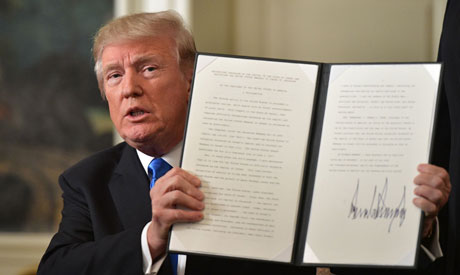
US President Donald Trump holds up a signed memorandum after he delivered a statement on Jerusalem from the Diplomatic Reception Room of the White House in Washington, DC on December 6, 2017. (AFP)
President Donald Trump reversed decades of US policy on Wednesday and recognised Jerusalem as the capital of Israel, despite warnings from around the world that the gesture further drives a wedge between Israel and the Palestinians.
In a speech at the White House, Trump said his administration would also begin a process of moving the U.S. embassy in Tel Aviv to Jerusalem, which is expected to take years.
Trump called his decision a "a long overdue" step to advance the peace process.
"I have determined that it is time to officially recognixe Jerusalem as the capital of Israel," Trump said. "While previous presidents have made this a major campaign promise, they failed to deliver. Today, I am delivering."
Trump acted under a 1995 law that requires the United States to move its embassy to Jerusalem, which was occupied by Israel in the 1967 war. His predecessors, Bill Clinton, George W. Bush and Barack Obama, had consistently put off that decision to avoid inflaming tensions in the Middle East.
Warnings and anger before the storm
The news earlier this week that Trump would announce on Wednesday a decision to move the US embassy in Israel from Tel Aviv to Jerusalem had sparked concerns and widespread criticism in the region and among the international community.
Palestinians, who have hoped for more than four decades that east Jerusalem would be the capital of their state in any political solution to the Palestinian-Israeli conflict, denounced Trump's decision, charging that his move reflects US biased against them in favour of Israel.
Over the past few days, Palestinians held angry demonstrations in the Israeli-besieged Gaza Strip and the occupied West Bank, with protesters burning both the US and Israeli flags and pictures of the American president.
Trump's decision ends a 37-year-old US foreign policy position of not recognising – along with the international community – Israel's 1980 decision to annex occupied East Jerusalem and designate a "unified Jerusalem" as an eternal capital for Israel.
The US president's decision comes as a fulfilment of a promise he made in 2016 while a candidate on the presidential campaign trail.
There are an estimated 325,000 Palestinians who live in occupied East Jerusalem under increasing occupation pressures.
In the past several years, Israel has been accelerating the pace of building illegal Jewish settlements in East Jerusalem and the West Bank to consolidate its hold over the occupied territories. Israeli settlers have also repeatedly stormed Al-Aqsa Mosque, Islam's third-holiest shrine, to lay claim on its grounds.
Earlier on Wednesday, Pope Francis called for the city's "status quo" to be respected, saying that new tension in the Middle East would further inflame world conflicts.
On Tuesday evening, Egyptian President Abdel-Fattah El-Sisi told Trump in a phone conversation that Cairo believes the legal status of Jerusalem should be maintained.
Both Egypt's Coptic Church and Al-Azhar issued statements warning of "dangerous consequences" of the US recognising Jerusalem as Israel's capital.
China said on Wednesday that the move could cause an "escalation" of tensions, while Russia's President Vladimir Putin told Palestinian Authority President Mahmoud Abbas in a phone call that the "situation is complex" and "expressed concern" about "possible exacerbation."
The Arab League announced in the afternoon that Arab foreign ministers would hold an emergency meeting on Saturday over the US' move to recognise Jerusalem as the Israeli capital.
Later in the day, EU diplomatic chief Federica Mogherini warned about the situation at a joint press conference with US Secretary of State Rex Tillerson, who was visiting Brussels for talks with the EU and NATO.
"We believe that any action that would undermine [the Palestinian-Israeli peace process] must absolutely be avoided," Mogherini said.
The PLO and Hamas, the two leading Palestinian factions, condemned Trump's decision to move the embassy.
Hamas leader Ismail Haniya sent a letter to Arab and Muslim leaders on Wednesday warning that "moving the American embassy to Jerusalem is a dangerous escalation and provides cover for the extremist government of [Israeli Prime Minister Benjamin] Netanyahu to carry out its plan to Judaise the city of Jerusalem."
Short link: